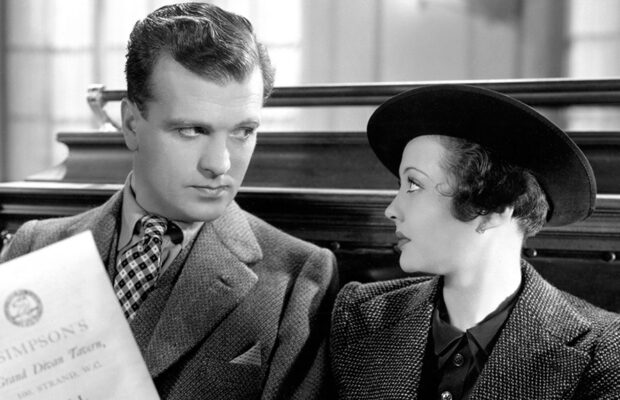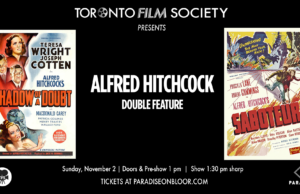The Lady Vanishes (1938)

Toronto Film Society presented The Lady Vanishes (1938) on Saturday, April 26, 2025 as part of the Season 77 Virtual Film Buffs Screening Series, Programme 7.
Production Company: Gainsborough Pictures. Producer: Edward Black. Director: Alfred Hitchcock. Screenplay: Sidney Gilliat and Frank Launder, based on the 1936 novel The Wheel Spins by Ethel Lina White. Cinematography: Jack E. Cox. Editing: R.E. Dearing. Music: Louis Levy, Charles Williams. Running time 97 minutes.
Cast: Margaret Longwood (Iris Matilda Henderson), Michael Redgrave (Gilbert Redman), Paul Lukas (Dr. Egon Hartz), Dame May Whitty (Miss Froy), Cecil Parker (Mr. Todhunter), Naunton Wayne (Caldicott), Basil Radford (Charters).

When discussing the many titans of Hollywood, a name that will inevitably come up is that of the great Alfred Hitchcock. Arguably the most influential filmmaker in history, the legacy that Hitchcock left behind is one of quality and unparalleled influence. However, while his title as one of the first film auteurs is something he lays claim to, something not unique to Hitchcock is the lack of public awareness of his early works. While his legendary Hollywood films such as Rear Window (1954) and Vertigo (1958) are rightly claimed to be some of the best pieces of American cinema, his work in the British film industry enjoys a lesser-known status.
Hitchcock’s early directorial efforts in Britain’s silent era were highly influential to the thriller genre with the likes of the fog-laden murder mystery The Lodger (1927) and these early films of his would shape the legend that we now know as the Master of Suspense. He would even helm the historically significant Blackmail in 1929, which many scholars cite as the first talkie produced in Britain.
But despite the accolades of his early works, they don’t enjoy the wider recognition that those later movies would experience. Among these is the 1938 mystery classic, The Lady Vanishes. The film follows a young English tourist named Iris (Margaret Lockwood) who is heading home to England to be married. While on the train ride home, she befriends Miss Froy (May Whitty), an elderly woman who is similarly heading home after spending the last several years in the fictional country of Bandrika. However, Miss Froy mysteriously vanishes from the train early in the journey and none of the passengers or crew appear to have any recollection of her. This sends Iris and a folk singer named Gilbert (Michael Redgrave) on a quest to unravel the mystery of Miss Froy before the train arrives in London.
The film is what you would expect of it. It’s well-acted, beautifully shot, and overall a worthy addition to the director’s repertoire. But a major distinguishing factor for the film is how it sits alongside other genre films of the time. What sets The Lady Vanishes apart from not only its contemporaries but even modern entries in the thriller/mystery genres is the strange sense of unreality it imparts to the audience.
The main plot itself is a tale of gaslighting at its core, a narrative point that becomes all the more visible when we take into account that the story is from the perspective of a young woman constantly being told that she is wrong. The audience is almost voyeuristically observing Iris question what is real and what isn’t and facing pushback from every conceivable angle. Given the recent conversations that we as a society have been having around the concept of gaslighting, especially since the global pandemic when the term gained wider acknowledgment, the aspect of the story creates a suspenseful unease throughout.
But even beyond the base narrative and how the lead interacts with it, Hitchcock creates a surreal atmosphere. The first act of the film takes place in the fictitious country of Bandrika, a seemingly strange land that melds several European cultures into a single location. The worldscape this creates is one of obvious familiarity, but also one that is firmly in the realm of the uncanny. We as an audience are easily able to distinguish these different cultures, but put together they create something wholly new and alien. The first time we see Bandrika is a model shot with static figures in the place of townspeople and cars being pulled by strings. A technical limitation of the time to be sure, but also an immediate introduction to the style of the film.
Where Hitchcock’s style truly shines, however, is his ability to balance a gripping mystery with hysterical comedy. A strong example of this is in the two characters of Charters and Caldicott, two tourists who are obsessed with cricket. This duo, while essentially only in the film for comic relief, successfully add a layer of humour that enhances the drama of the story unfolding. Their little vignettes that permeate the story are entirely welcome and their film-long quest to get home in time for the big match is genuinely gripping. Naunton Wayne and Basil Radford’s portrayals of Charters and Caldicott were indeed so successful that the characters would live on in film, television and radio plays.
On the other side of the comedic spectrum is the tale of Eric Todhunter (Cecil Parker) and his mistress (Linden Travers). The two occupy a space in the narrative that could best be described as a sub-plot, but their marital drama is full of sexual innuendo and promiscuity to an extent that is almost shocking for a film made in 1938. Much of the comedy is based on sexual tension. Whether it’s between Iris and the flirtatious Gilbert, Mr. and “Mrs”. Todhunter, or even the misunderstandings between Charters, Caldicott, and a beautiful maid, the film’s sexual comedy is just another instance of his film standing apart from many of the time.
So why hasn’t The Lady Vanishes enjoyed as much appreciation from modern film fanatics? Quite simply, while a strong film, it’s overshadowed by the place his Hollywood career occupies within the zeitgeist. It doesn’t have the intensity of Psycho (1960), the adventure of North by Northwest (1959) or the slow burn of The Birds (1963). But that fact should not disqualify it from being both seen and appreciated. In an era where the medium of cinema is being further corporatized to the point where films are deleted for tax write-offs or dumped on (or even taken off of) streaming services to be forgotten by history, we as a community should make an effort to watch the “forgotten” films of the past.
Because within the past are true gems like The Lady Vanishes.
Notes by Ryan Tocheri

Virtual Saturday Night at the Movies
Toronto Film Society will be screening Sabotage (1936) straight to your home on Saturday, February 28, 2026 at 7:30 p.m. (ET)! Directed by Alfred Hitchcock, starring Sylvia Sidney, Oscar...







